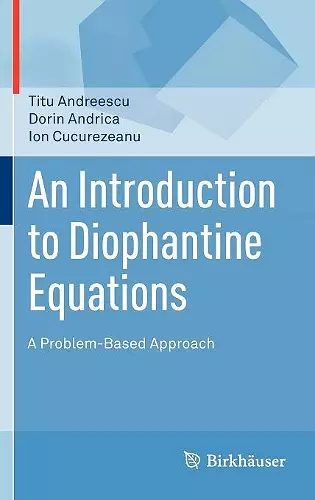An Introduction to Diophantine Equations
A Problem-Based Approach
Titu Andreescu author Dorin Andrica author Ion Cucurezeanu author
Format:Hardback
Publisher:Birkhauser Boston Inc
Published:13th Sep '10
Should be back in stock very soon

This book provides an insightful introduction to Diophantine equations, focusing on problem-solving techniques and a variety of engaging exercises.
This engaging book serves as a comprehensive introduction to the fascinating world of Diophantine equations, where the focus is solely on finding integer solutions. An Introduction to Diophantine Equations delves into various classical forms of these equations, such as linear, Pythagorean, and higher-degree equations, alongside exponential Diophantine equations. The text is designed to equip readers with essential problem-solving skills and elementary methods that are crucial for tackling these mathematical challenges.
Throughout the book, readers will encounter a range of exercises and problems, many of which are original or presented with unique solutions. This approach not only fosters a deeper understanding of Diophantine equations but also encourages creative thinking and exploration in mathematics. The selection of problems is carefully curated to appeal to a diverse audience, including undergraduates, advanced high school students, and teachers, as well as participants in mathematical contests such as the Olympiad and Putnam.
An Introduction to Diophantine Equations stands out for its emphasis on unconventional and non-routine examples, offering insights and techniques that go beyond standard methodologies. This makes it a valuable resource for anyone interested in enhancing their mathematical skills and understanding of this intriguing area of study.
From the reviews:
“This book is devoted to problems from mathematical competitions involving diophantine equations. … Each chapter contains a large number of solved examples and presents the reader with problems whose solutions can be found in the book’s second part. This volume will be particularly interesting for participants in mathematical contests and their coaches. It will also give a lot of pleasure to everyone who likes to tackle elementary, yet nontrivial problems concerning diophantine equations.” (Ch. Baxa, Monatshefte für Mathematik, Vol. 167 (3-4), September, 2012)
“This book explains methods for solving problems with Diophantine equations that often appear in mathematical competitions at various levels. … The book can be recommended to mathematical contest participants, but also to undergraduate students, advanced high school students and teachers.” (Andrej Dujella, Mathematical Reviews, Issue 2011 j)
“Diophantus’ Arithmetica is a collection of problems each followed by a solution...The book at hand is intended for high school students, undergraduates and math teachers. It is written in a language that everyone in these groups will be familiar with. The exposition is very lucid and the proofs are clear and instructive. The book will be an invaluable source for math contest participants and other math fans. It will be an excellent addition to any math library.” (Alex Bogomolny, The Mathematical Association of America, October, 2010)
“Diophantine analysis, the business of solving equations with integers, constitutes a subdiscipline within the larger field of number theory. One problem in this subject, Fermat's last theorem, till solved, topped most lists of the world's most celebrated unsolved mathematics problems, so the subject attracted much attention from mathematicians and even the larger public. Nevertheless, sophisticated 20th-century tools invented to attackDiophantine equations (algebraic number fields, automorphic forms, L-functions, adelic groups, etc.) have emerged as proper objects of study in their own right. So for a popular subject, modern lower-level works focused on the individual Diophantine equation (and not on big machines aimed generally at classes of such equations) are relatively rare. The present volume…fills this need...Summing Up: Recommended. Lower- and upper-division undergraduates and general readers.” (D.V. Feldman, Choice, July, 2010)
ISBN: 9780817645489
Dimensions: unknown
Weight: unknown
345 pages
2010 ed.